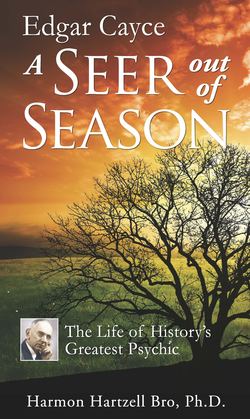Читать книгу Edgar Cayce A Seer Out of Season - Harmon Hartzell Bro - Страница 44
На сайте Литреса книга снята с продажи.
Investing the Spirit
ОглавлениеFor my entries of push in the spiritual dimension of health, the first question was who did the pushing: the ultimate author of an individual’s life and opportunities. Self-responsibility was a strong, recurrent theme in the readings. It was prominent, for example, in the treatment of reincarnation and karma, where both suffering and creative talents were frequently presented as fruits of choices and deeds undertaken long ago. But self-responsibility and trying to author oneself were not the same. In Cayce’s view the biblical metaphor of call and response was most often used to address the question of destiny. Each soul had been called into being with certain unique possibilities, talents, and gifts. It was not finally self-invented. Being responsible, then, meant responding to that original call of the Creator, however dimly or clearly heard, in activities which plucked the vibrating string of central purpose set within each person by the Maker. At times Cayce drew on Isaiah 6:8, urging, “When the call comes, ‘Here am I; send me; use me!’ ” to suggest how the individual’s pushing might best be shaped in relationship to God. Such an approach could forestall the cramp and rebellion of a self-contrived life, sure to manifest itself in disorders of the body.
The spiritual issue of sacrifice came up inevitably in notes on the “push” or investment character of health. When might one expect to push, or be pushed, so far as to threaten self-interest or self-development? For all of the entranced Cayce’s concern with health as wholeness and balance, he did not try to go around sacrifice. Instead he affirmed that for everyone the fires of self-will and self-indulgence must someday, in some lifetime, be extinguished on the altar of love. Each person could expect what amounted to an ultimate crucifixion, not as punishment but as fulfillment of the very nature of existence, where self-centeredness had finally to yield to God-centeredness. Each could discover in the temple of the body, by turning within to meet the Author of life, when such sacrifice was appointed and could be met without fear. It would not be a call to extinction, though it might involve humiliation and suffering. For Cayce quoted often the biblical promises as sure: “God hath not willed that any soul should perish, but hath with every temptation provided a means of escape.”38
The entranced man did not counsel self-mortification or needless martyrdom. It was not identity that required sacrificing, but only those preoccupations that were outworn, to be left behind. There might be a different kind of sacrifice, too, of privilege, in order to learn through the soul’s choice of hardship, pain, or lowly estate just what others were in fact enduring and how to be filled with longing to be helpful. As Cayce spoke about the suffering and crucifixion of Christ, he affirmed that it had entailed real pain, not sham. But he also disclosed (in what seemed a daring extension of his counseling vision) what was the spirit of Jesus that enabled him to choose faithfulness, even to the cross. Cayce reported as the inner prayer often in the Galilean’s thoughts: “Others, Lord, others.” Choosing to live by the same spirit, none could expect to avoid the crucifying of self-will.
